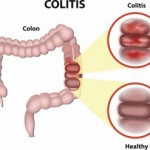Celiac disease, Crohn’s disease share common symptoms and part of their genetic background
 Celiac disease and Crohn’s disease are two common inflammatory bowel diseases (IBD) that not only share common symptoms but also part of their genetic background. In both celiac disease and Crohn’s disease there is inflammation of the intestines but how that inflammation is triggered differs.
Celiac disease and Crohn’s disease are two common inflammatory bowel diseases (IBD) that not only share common symptoms but also part of their genetic background. In both celiac disease and Crohn’s disease there is inflammation of the intestines but how that inflammation is triggered differs.
Celiac disease is intolerance to gluten and so when a person consumes gluten it creates an immune response which contributes to inflammation along with other symptoms. In Crohn’s disease is a disease which can occur at any part of the digestive system – from the mouth to the anus. Another autoimmune disease, an immune response is triggered which contributes to painful and uncomfortable symptoms.
Proper diagnosis is key in order to properly manage either condition and reduce flare-ups and live a normal life.
Celiac disease and Crohn’s disease share some part of their genetic background: Precious study
 Previous research found that celiac disease and Crohn’s disease share part of their genetic background. Researchers combined meta-analysis of genome-wide data for both diseases where they found shared risk loci.
Previous research found that celiac disease and Crohn’s disease share part of their genetic background. Researchers combined meta-analysis of genome-wide data for both diseases where they found shared risk loci.
Although some aspects of celiac disease and Crohn’s disease are understood, there are still many questions which researchers are trying to uncover. Researchers do know that both genetic and environmental factors play a role in both diseases. Celiac disease is more common than Crohn’s disease and although celiac is known to be triggered by gluten, less is known about what exactly causes Crohn’s disease.
It has been revealed that celiac patients are at a higher risk for Crohn’s disease which reveals that they may share some genetic background.
Although the researcher’s uncovered shared genetic backgrounds for both diseases further research is still required to understand fully the exact mechanisms behind both diseases.
Crohn’s disease and celiac disease, overlaps and differences
 Genetically and symptomatically both Crohn’s disease and celiac disease have much in common, but it’s important to note that there are very important differences between the two as well.
Genetically and symptomatically both Crohn’s disease and celiac disease have much in common, but it’s important to note that there are very important differences between the two as well.
Symptom-wise shared symptoms include: abdominal pain, diarrhea, anemia, rectal bleeding, inflammation of the intestines (uncovered by a scope), weight loss and fever.
In order to better distinguish between Crohn’s disease and celiac disease your doctor may perform a blood test which will reveal different results. Furthermore, your doctor will alter your diet. They may take you off gluten for quite some time to see how you react and to note if symptoms worsen or get better.
Both diseases involve either endoscopy or colonoscopy in order to conduct a biopsy and check for inflammation. A biopsy – a piece of tissue taken from the stomach, intestines or colon – will help doctors make a clearer diagnosis because both diseases look different under a microscope.
Treatment, too, is quite different between both diseases. To treat Crohn’s disease drug therapy, diet changes and surgery are effective treatment methods where as in celiac disease a strict no-gluten diet is the best form of treatment.
In both cases, though, they are life-long diseases which require constant attention and management. Knowing what to eat and what not to eat can help ease both diseases. As long as you are vigilant in your care you will have greater success in managing both diseases.
Crohn’s disease causes, symptoms, treatments and role of gut bacteria
Crohn’s disease is an inflammatory bowel disease (IBD,) which affects the intestines by causing inflammation. This inflammation can trigger abdominal pain, diarrhea, weight loss and malnutrition. Inflammation can occur anywhere in the digestive tract and affects individuals differently. Crohn’s disease is also an autoimmune disease, which means the body’s own immune system believes the digestive tract is harmful and attacks it. Continue reading…
-
Lose Weight To Improve Your Diabetes Condition
Loss in every situation can not be considered as the loss. Some lo
-
The Biggest Loser 2 A Tale Of 2 Losers
When it comes to losing weight, what do you think is the biggest contr
-
Yoga Rehab: a real find or fad?
Does yoga aid individuals getting off drugs? Can it improve one&rsq
-
Juice Your Way to 10 Pounds of Fat Loss FAST!
Okay, I am not talking about some newfangled human juicing machine
-
What The Diet Industry Wont Tell You6 Secrets Revealed
I am not a diet and fitness guru or an obesity expert. Im just a norm
-
The Global Obesity Crisis
Increased Fast Food Access Leads to Increase T2 Diabetes (caused
- DON'T MISS
- Canine Diabetes: A Diabetic Patient And His Diabetic Dog!
- Vibration Training Machines- A New Beginning For A Healthy Life
- Now Lose Weight Without Reducing the Fullness on your Face
- Is Evening Eating Destroying Your Weight Loss Efforts?
- End Your Weight Loss Frustration By Fasting Away Your Extra Pounds
- 7 Diet Secrets of the Stars
- Develop Healthy Habits To Lose Weight Fast
- Taking aim at belly fat
- Fast Weight Loss Tips For Beginners
- BodyRock Sweatography: 6 Months of Hiit




